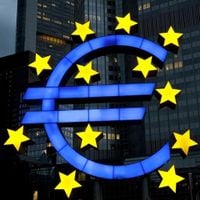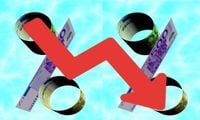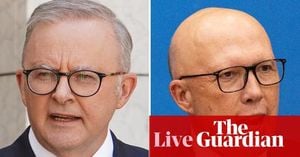On April 17, 2025, the European Central Bank (ECB) announced a significant cut in interest rates, marking a pivotal moment in its ongoing monetary policy adjustments. The cut, which reduced rates by 0.25 percent, is the seventh decrease since June 2024 and the third in just four months. Starting April 23, the interest rate on deposits with the central bank will drop to 2.25 percent, while the rates on main refinancing operations and marginal refinancing operations will be set at 2.4 percent and 2.65 percent, respectively.
This decision comes amid a backdrop of declining inflation rates, as noted by ECB President Christine Lagarde. In a statement following the meeting, Lagarde emphasized that the decision to cut rates was unanimous among the governing council members. She affirmed, "The process of disinflation is well underway," highlighting that both overall inflation and core inflation have shown signs of easing in recent months.
March data indicated a notable decline in inflation rates, including a marked decrease in the inflation of services. Lagarde pointed out that the measures of core inflation suggest a stabilization around the ECB's medium-term target of 2 percent. She stated, "The updated assessment of inflation prospects and core inflation dynamics led to the decision to cut rates."
Analysts have noted that the latest ECB communiqué did not reference any restrictive monetary policy stance, a shift from previous meetings. This change indicates a more accommodative approach to support the economy in light of ongoing global uncertainties.
While the ECB's actions aim to bolster economic growth and consumer confidence, Lagarde warned of potential challenges ahead. She stated, "The outlook for expansion has deteriorated due to rising trade tensions," which could lead to reduced consumer spending and investments. These uncertainties may further impact confidence among households and businesses, potentially tightening financing conditions.
In the context of these monetary adjustments, Lagarde also addressed the implications of increased defense spending within the European Union. She noted that while such spending could contribute positively to economic growth and job creation, there are risks that it might also stoke inflationary pressures in the medium term, counteracting the progress made thus far.
Looking forward, Lagarde emphasized the ECB's data-driven approach, stating that decisions will be made based on available data and economic conditions. She mentioned the suspension of tariffs, which is in effect until July 14, 2025, as a critical factor to monitor in the coming months. Additionally, she referenced upcoming political elections in Portugal on May 18, 2025, and the formation of a new German government, which will further shape the economic landscape.
In light of these developments, analysts have varied expectations for future rate cuts. Simon Dangoor, Head of Fixed Income Macro Strategies at Goldman Sachs Asset Management, anticipates three more consecutive cuts in upcoming meetings, potentially bringing the deposit rate down to 1.5 percent by the end of the year. He stated, "Given the current market uncertainties, we foresee additional rate cuts to support economic growth in the euro area."
Tomasz Wieladek, Chief European Economist at T. Rowe Price, echoed similar sentiments, suggesting that the ECB is likely to reduce the deposit rate significantly below the neutral rate. He noted, "The omission of any mention of a restrictive stance in the current context signals the ECB's intent to lower rates more aggressively than the market currently expects."
As the ECB navigates these turbulent waters, the balance of risks has shifted toward lower inflation, with the bank committed to achieving its target of 2 percent. Lagarde reiterated the ECB's readiness to utilize all available tools to ensure price stability and facilitate the orderly transmission of monetary policy across the euro area.
In summary, the ECB's latest rate cut reflects a proactive stance in addressing economic challenges while aiming to stabilize inflation. The interplay of monetary policy, geopolitical tensions, and upcoming political events will undoubtedly shape the eurozone's economic trajectory in the months to come.







